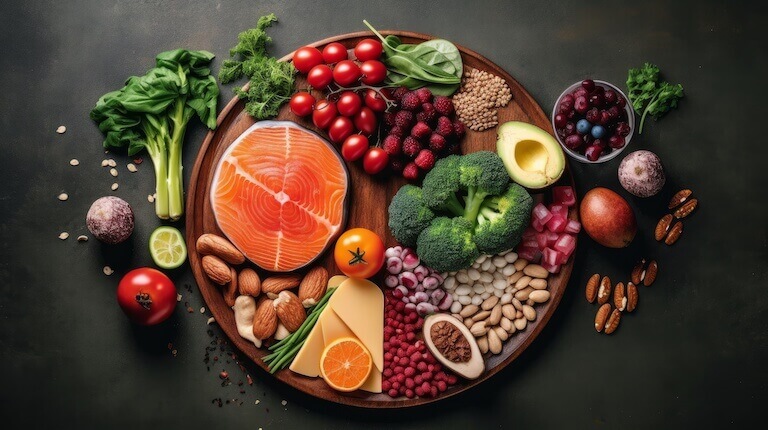Have you ever had something to eat and felt a distinct change in your mood? That stomach ache you had from eating too much spicy food? It’s not only causing your physical discomfort, but it’s probably also affecting your focus or even your happiness. You may be wondering, what’s going on when you feel this way?
Your brain is your most complex organ and is constantly working, even when you’re asleep. And food can heavily influence just how effective the brain is at doing its job. But, it’s more complicated than that.
We’ll explore how food can affect your mood, the secret influences of your gastrointestinal tract, and the benefits of holistic nutrition and wellness education.
Food is Fuel
Holistic nutrition and wellness has a lot to do with understanding the essential needs for someone to live a healthy life. The effects of food on the body and mind will be different from person to person, but let’s break it down into simpler terms.
Think of your body as a top-of-the-line Mercedes Benz. Anyone who has ever owned one of these vehicles knows that the premium price tag isn’t the only premium you’ll be paying for owning it. While the car runs on fuel like most others on the road, the type of fuel you put into it for the car to run smoothly is different.
While you could fill up the vehicle with low-quality fuel to continue driving, it won’t be good for the vehicle in the long run. Instead, premium vehicles ask for premium fuels to help them run effectively. The same is true with the human body; the better your nutritional choices, most likely, the better your physical and mental health should be, too.
A clear example of this is shown through serotonin. Serotonin is a key neurotransmitter in your body that influences your sleep, appetite, mood, and even pain receptors.
Research shows that about 95% of serotonin in the body is produced in your gastrointestinal tract. That means your digestive system plays an important part in determining your mental health—a clear indicator of how food affects your mood. All of these factors influence how a nutritionist, for instance, might help clients shape their daily diet to improve their health.
The Secret of the “Second Brain”
Some might argue that the human body has not one, but two brains that control all of its functions. While this sounds like science fiction, we assure you it’s not.
The “second brain” that many scientists and health professionals are referring to is the enteric nervous system, which is commonly associated with your gastrointestinal system.
This is where all of the talk about having good “gut health” derives from. The kombucha, kefir, and other products you might love to eat and drink are fostering the growth of hardworking bacteria in your gut. It sounds a bit bizarre, but there is a growing amount of research that suggests the bacteria in your gut have a lot of power over your overall health.
What are gut health-boosting foods?
Gut health-boosting foods may support your immune system and could help prevent diseases in your body. These can contain probiotics themselves or prebiotics, which are food for probiotics. Here’s a few to look out for:
- Kimchi and pickled vegetables
- Kefir and yogurt
- Leeks and onions
- Raspberries
- Asparagus
- Beans and legumes
In short, the saying, “you are what you eat,” might actually have more truth to it than many originally thought. The food you make for yourself and others can have immense power for affecting your mood.
A Healthy Diet for Whole-Body Wellness
So, we’ve established that good nutrition is important for mental wellbeing and that food affects your mood. We’ve also touched upon how the bacteria produced from the food you ingest have been shown to have impacts on your brain and body.
All of this is connected to your diet, and as someone interested in culinary arts, it’s important to have a solid understanding of the nutritional value of the food you make.
While diets are highly personalized to our individual needs, generally speaking, a healthy diet consists of five major food groups: vegetables, fruits, lean protein sources, whole grains, and milk and dairy products.
And while all of these food groups can work together to provide a balanced distribution of key nutrients and vitamins to the body, one diet that has shown beneficial results for how food affects your mood is the Mediterranean diet.
What is the Mediterranean Diet?
The Mediterranean Diet is a way of eating based on the eating habits of people from countries bordering the Mediterranean Sea. It’s a fairly flexible diet with no single definition. Most often, it’s high in:
- Vegetables
- Fruits
- Whole grains
- Beans
- Nuts and seeds
- Olive oil
- Seasoning with herbs and spices
But it’s easy to get caught up in the wild world of diet culture. Certainly, there is a lot of merit in understanding the optimal foods to eat for a healthy body. But sometimes you might just be having a bad day and need a pick-me-up. Think about those nights on the couch when you’re watching your favorite show and eating some chocolate and other treats. Sometimes that’s all you need to quickly shift your mood.
Understanding what foods affect you—and how—can be a powerful way to take greater control over your life.
Empower Your Body and Mind
If you’re someone who’s already interested in natural ways to improve your wellness, then pursuing an education in holistic nutrition may be for you. You can discover more about mood foods, probiotics, and diets that can facilitate good gut health.
People who pursue an education in Holistic Nutrition may become personal chefs or food wellness coaches who work everyday to help others find foods that make them feel good both physically and mentally. Contact us today for more information!





